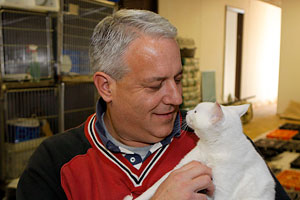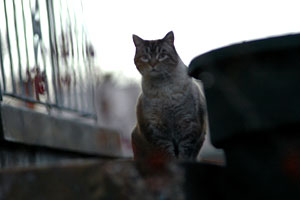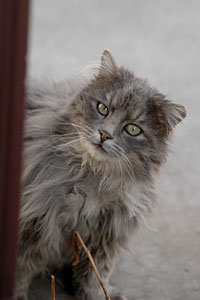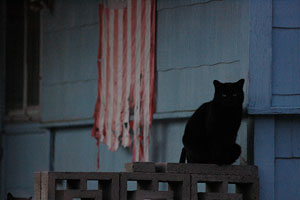Rick DuCharme, the Heavy Equipment Dude that Saves Kitties
 Rick DuCharme will be presenting at the Best Friends National No More Homeless Pets Conference in Las Vegas, October 15 – 17. We are nearing 1,000 attendees and are almost sold out. Registration closes this Friday, October 8th.
Rick DuCharme will be presenting at the Best Friends National No More Homeless Pets Conference in Las Vegas, October 15 – 17. We are nearing 1,000 attendees and are almost sold out. Registration closes this Friday, October 8th.
In the early 90’s, I was restoring a historic house in the Marmalade District on Salt Lake City’s Capitol Hill. As part of my crew, I hired a gentle guy named Doug, a Native American from the local Navajo Tribe. As we worked our way through the building inspector’s stiff requirements, our great challenge became excavating the stairs to lessen the steepness of the slope to the basement. Access to the basement was difficult, but Doug, with his easy athletic way, could get up and down gracefully. One day, I was busy chiseling off plaster upstairs when I heard Doug shouting, and what sounded like a very annoyed cat.
A cat?
This was my first introduction to a feral cat. She was a little tabby I named Helen. Beautiful and intriguing, she had made her home in the basement. I had no idea what a feral cat was or how to relate to her. As far as I was concerned, she was there first and I was disrupting her home. I knew enough to know that if I took her to the shelter, she would be killed. I also knew that if she was visible to any of the neighbors, she would be cleaned up like the weekly trash. Helen was simply not considered part of her community.
Nationwide, only 2 percent of cats who enter shelters are returned to their families. Most of the cats entering shelters are regarded as fractious or feral, and are held for 3-5 terrifying days, then killed. These cats, just like Helen, have never been accepted as part of the community. Trap/neuter/return (TNR) has typically solely been the province of rescue organizations and dedicated people who love cats. TNR efforts are often stealth operations done despite the objections of local authorities. But not today in Jacksonville, Florida!
One unlikely guy – Rick DuCharme – changed things for cats in his community. Rick is as mainstream a dude as they come, he started out selling heavy equipment for a living and moonlighting on the side for homeless pets, before he dedicated his life to saving animals full-time. Fun, affable and well spoken, Rick Ducharme charmed Jacksonville community leaders into doing all sorts of unlikely things for the animals.
Rick founded First Coast No More Homeless Pets after attending a No More Homeless Pets Conference back in 2003. Rick took the lessons he learned from the conference back to Jacksonville and built what is today, one of the safest cities for cats on the planet. 
Through a community partnership with the City of Jacksonville, First Coast NMHP, and Best Friends Animal Society, the Feral Freedom program helps cats like Helen - free roaming cats - are being trapped by Animal Control Officers (!) and volunteers, then spayed or neutered, and returned to their community habitats to live with the people of Jacksonville – bypassing entirely the typical one-way trip to the shelter system and certain death. Helen is now part of the fabric of her community. This is one of those “duh” moments. It shakes out as an easy-breezy alternative to killing cats. So simple and obvious...Voila! Not feral cats, not wild cats, COMMUNITY CATS! All of this with total endorsement and money from the City of Jacksonville.
Solving the problem of homeless pets isn’t rocket science, it’s a matter of public commitment, and that depends on how the public views these animals: as a nuisance or as members of our wider community. The work that Rick DuCharme did in his community to elevate the status of homeless pets set the stage for a unique solution that a few years ago would have been greeted by official opposition rather than partnership.
So how do we get more communities around the country to embrace change for animals? Since the founding of Best Friends 26 years ago, we’ve offered a different way of thinking about animals and we have spread our message that homeless pets are not numbers, not statistics, but individual beings of intrinsic value. Back then, more than 17 million homeless pets were being killed in shelters every year. The conventional wisdom was that this was a necessary evil. The big national and regional animal welfare organizations said that it was the kindest thing to do. It was kind to kill, and the discussion of the day was not how to stop the killing, but how best to eliminate the animals on hand.
But Best Friends and a few other lone voices out there like Richard Avanzino of the San Francisco SPCA and the original no-kill thought leader Ed Duvin were shouting and waving, saying “No! It shouldn’t be this way.... It doesn’t have to be this way!” Killing homeless pets wasn’t a necessary evil; it was just plain evil, and it needed to end. The idea was a game changer. The No-Kill Movement was born.
We’ve come a long way since then. The number of animals being killed is down to five million. Through the dedicated work of thousands of people like you, and through superb model spay/neuter and adoption programs, we’ve made steady progress, but there’s still work to be done.
It’s time to break through the barrier and challenge conventional wisdom once again as Rick did in Jacksonville. Looking at our shelters, the majority of the animals being killed fall into four categories: cats, bully-breed dogs, the spillover from puppy mills and other exploitative breeders, and pets surrendered to shelters by their people. Best Friends is committed to helping solve these issues through our four campaigns, (an R&D, if you will, for creative community programming). Focus on Felines, Pit Bulls: Saving America’s Dog, Puppies Aren’t Products, and First Home Forever Home, are all aimed at elevating the status of animals in our society and breaking through that ceiling of five million killed. Together, we’ll be working with many more communities like Jacksonville to embrace all the Helens out there.
So join us at the No More Homeless Pets Conference in two weeks, October 15-17 to learn more about innovative and lifesaving programs like Jacksonville’s Feral Freedom. You’ll be joining the great company of all who heard this message last year and the years prior in taking the final steps toward the time when the killing finally ends and there are no more homeless pets. Helen – and all the animals like her – need you!
